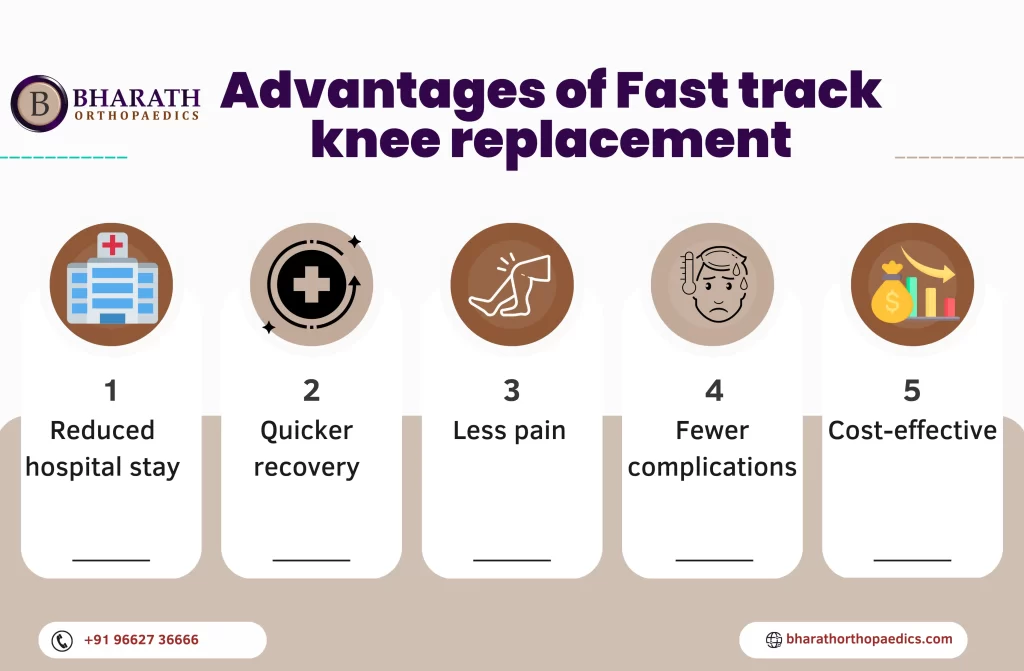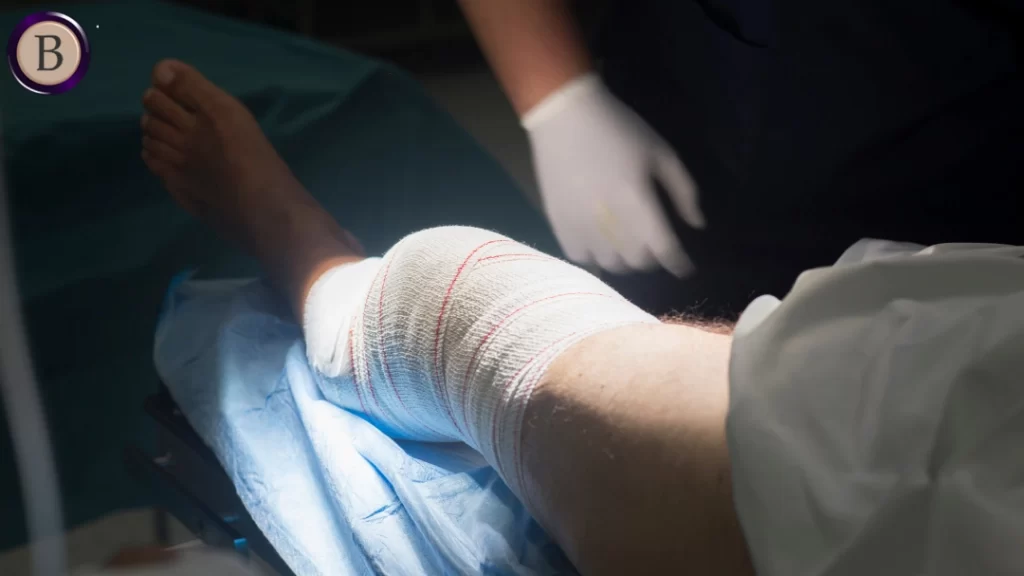The knee is the largest joint in the human body which supports the movement of the legs and is essential to perform day-to-day activities. Routine activities can be affected due to injury or damage to the knee causing severe pain or impaired function which paves the way for knee replacement. One such procedure is the fast track knee replacement in Chennai.
Fast track knee replacement is a fast track knee recovery technique. It’s a precise way of doing surgery that ensures a consistent and reproducible outcome for the Surgeon and a higher level of satisfaction for the patient.
The fast track knee replacement surgery is a personalized method of enhanced recovery that has been designed safely and effectively to improve the outcomes followed by knee replacement surgery. The fast track knee replacement program offered by the orthopedic department involves creating a customized treatment plan for every patient.

Pain Management and Early Mobilization
Pain management and early mobilization are critical components of fast track knee replacement in Chennai, aiming to enhance recovery and patient satisfaction:
- Pain Management:
- Multimodal Approach: Using a combination of medications (e.g., NSAIDs, acetaminophen) to target different pain pathways, reducing reliance on opioids.
- Regional Anesthesia: Employing techniques like epidurals or nerve blocks to numb the surgical area, minimizing immediate post-operative pain.
- Local Anesthetics: Administering local anesthetics directly to the surgical site during the procedure for continued pain relief.
- Patient-Controlled Analgesia (PCA): Allowing patients to self-administer pain medications within preset limits, empowering them in managing their pain.
- Early Mobilization:
- Physical Therapy: Initiating gentle exercises soon after surgery to prevent stiffness, improve circulation, and promote joint flexibility.
- Ambulation: Encouraging patients to start walking with assistance as soon as possible post-surgery to regain strength and mobility.
- Assistive Devices: Providing walkers or crutches to support safe movement and reduce strain on the knee joint during early recovery.
- Structured Rehabilitation: Tailoring rehabilitation programs to individual needs, gradually increasing intensity to restore normal function.
By effectively managing pain and promoting early mobilization, fast track knee replacement in Chennai aims to accelerate recovery, reduce complications, and enhance overall patient outcomes, ensuring a smoother transition back to daily activities.
A Pain-Free and Efficient Approach to Joint Surgery
With the growing elderly population and rising incidence of osteoarthritis, it is expected that the demand for knee arthroplasty will increase. The growing financial pressures and challenges in providing affordable healthcare have underscored the importance of prioritizing fast-track (FT) approaches.
The SMART technique ensures minimal blood loss in which there is no requirement for blood transfusion. The primary benefit is prompt postoperative pain alleviation, which enables patients to start walking within 4 to 5 hours after the surgical procedure.
Painless surgery motivates the psychology of the patient to ambulate early and climb stairs on day one. The rehabilitation of fast track knee replacement in Chennai is faster as compared to conventional surgery thus facilitating discharge on day two. The patient can return to normal life 15 days after surgery.
On testing the results of SMART knee replacements, the complications like deep vein thrombosis and infection rate have been significantly reduced making a safer procedure for all age groups.
Knee Replacement Surgeon in Chennai
Dr. L. Bharath
MBBS, MS (Orthopaedics), DNB (Orthopaedics)
Dr. L. Bharath is one of the leading Knee Replacement Surgeons in Chennai, renowned for his expertise in fast track knee replacement surgeries. With over 10,000 successful joint surgeries to his name, Dr. Bharath focuses on minimally invasive techniques that promote faster recovery. His proficiency in knee replacement surgery in Chennai has earned him a reputation for delivering excellent results with reduced pain and quicker mobility. Patients benefit from personalized care and cutting-edge technology, making Dr. Bharath a top choice for those seeking a skilled knee replacement surgeon in Chennai.
- Years of Experience: Over 20 years
- Available Time: Mon-Sat 9 am to 8 pm | Sun – 10 am to 3 pm
- Address: Flat-A Ground Floor , Balaji Villa, New Door No.38/1, Old Door No.9/1, Rajaratnam Street, Kilpauk, Chennai-600010.

Advanced Fast Track Knee Replacement Chennai
Minimally invasive technique with less tissue damage.
- Shorter hospital stays and faster recovery times.
- Immediate mobilization and reduced need for prolonged physiotherapy.
- Personalized post-operative rehabilitation for quicker return to daily activities.
- Advanced pain management techniques for better comfort.
- Use of cutting-edge surgical tools for precise alignment and function restoration.
These innovations make Advanced Fast Track Knee Replacement Chennai a preferred option for patients seeking faster recovery and improved mobility post-surgery.
Objective of Fast Track Knee Replacement in Chennai
The objective of fast track knee replacement in Chennai, as in other locations, is to optimize patient outcomes through a streamlined and efficient approach to surgery and recovery. Specifically, the goals include:
- Minimized Hospital Stay: Reducing the length of hospitalization, often to just a few days, which lowers healthcare costs and reduces the risk of hospital-acquired infections.
- Enhanced Recovery: Facilitating a quicker recovery process through advanced surgical techniques, optimized pain management, and early mobilization protocols.
- Improved Patient Satisfaction: Providing patients with a smoother and less painful recovery experience, leading to higher satisfaction rates post-surgery.
- Reduced Complications: Implementing strategies to lower the incidence of complications such as infections, blood clots, and joint stiffness.
- Optimal Functional Outcomes: Focusing on restoring knee function and mobility as soon as possible after surgery, allowing patients to return to normal activities sooner.
- Cost-Effectiveness: Utilizing efficient healthcare resources and reducing the overall economic burden on patients and healthcare systems.
By achieving these objectives, fast track knee replacement in Chennai aims to offer patients a more effective and comfortable surgical experience with improved long-term outcomes.
Breaking Down the Fast Track Knee Replacement Surgery: An Overview of Its Three Phases
The fast track knee replacement in Chennai program and its approaches are divided into three phases according to the surgical process:
Pre-Operative Phase
The pre-operative phase of fast track knee replacement in Chennai is crucial in preparing patients for surgery and optimizing outcomes. Key aspects include:
- Patient Education: Providing detailed information about the procedure, expectations for recovery, and rehabilitation exercises.
- Medical Evaluation: Conducting thorough medical assessments to ensure patients are fit for surgery and anesthesia.
- Optimization of Health: Addressing any medical conditions, such as diabetes or hypertension, that could affect surgery or recovery.
- Pain Management Planning: Discussing pain management strategies pre-operatively to minimize discomfort post-surgery.
- Nutrition and Hydration: Advising on proper nutrition and hydration to promote healing.
- Medication Review: Reviewing current medications and adjusting as needed to reduce risks during and after surgery.
- Physical Therapy Preparation: Introducing pre-operative exercises to strengthen muscles around the knee and improve flexibility.
- Psychological Preparation: Addressing any anxiety or concerns about the procedure through counseling or support services.
- Home Preparation: Providing guidance on preparing the home environment for post-operative recovery, including assistive devices if necessary.
- Consent and Planning: Obtaining informed consent and scheduling surgery at a time that suits both the patient and surgical team.
By focusing on these elements, the pre-operative phase of fast track knee replacement in Chennai aims to ensure patients are well-prepared physically, mentally, and emotionally for surgery, setting the stage for a successful recovery.

Check out Keyhole Surgery in Chennai.
Intra-Operative Phase
The intra-operative phase of fast track knee replacement in Chennai focuses on optimizing surgical techniques and patient care to enhance recovery. Key aspects include:
- Minimally Invasive Surgery: Using techniques that minimize trauma to surrounding tissues and reduce post-operative pain.
- Precise Implant Placement: Ensuring accurate positioning of the knee implant for optimal function and longevity.
- Advanced Anesthesia Techniques: Employing regional anesthesia (e.g., spinal or epidural anesthesia) to minimize systemic effects and facilitate early post-operative mobilization.
- Blood Management: Utilizing strategies such as tranexamic acid or cell salvage techniques to minimize blood loss during surgery.
- Surgical Efficiency: Streamlining procedures to reduce operative time and minimize exposure to anesthesia.
- Intra-operative Pain Management: Administering local anesthetics or nerve blocks to manage pain immediately following surgery.
- Careful Tissue Handling: Gentle handling of tissues to reduce inflammation and promote faster healing.
- Preventive Measures: Taking steps to prevent complications such as deep vein thrombosis (DVT) and infection during surgery.
By focusing on these aspects, the intra-operative phase of fast track knee replacement in Chennai aims to lay a solid foundation for a smooth post-operative recovery, allowing patients to return to normal activities with minimal delay.
Post-Operative Phase
The post-operative phase of fast track knee replacement in Chennai focuses on promoting rapid recovery and optimal outcomes. Key aspects include:
- Pain Management: Utilizing advanced pain relief techniques such as nerve blocks, epidurals, or multimodal analgesia to minimize discomfort.
- Early Mobilization: Encouraging patients to start moving and walking soon after surgery to prevent stiffness and promote circulation.
- Physical Therapy: Starting rehabilitation exercises early to regain strength, flexibility, and function in the knee joint.
- Nutrition and Hydration: Ensuring adequate nutrition and hydration to support healing and recovery.
- Monitoring: Regular monitoring of vital signs, wound healing, and potential complications like infection or blood clots.
- Discharge Planning: Planning for discharge from the hospital as soon as medically appropriate, with arrangements for home care or outpatient rehabilitation if needed.
- Patient Education: Providing comprehensive education on self-care, medication management, and exercises to continue at home.
- Follow-Up: Scheduling follow-up visits with the orthopedic surgeon to monitor progress and address any concerns.
The goal of the post-operative phase in fast track knee replacement is to facilitate a swift and successful recovery, enabling patients to regain mobility and resume their daily activities as soon as possible.

Advantages of Fast Track Knee Replacement
Fast track knee replacement offers several distinct advantages over traditional approaches:
- Shortened Hospital Stay: Patients often spend fewer days in the hospital, promoting quicker recovery and reducing healthcare costs.
- Reduced Complications: Optimized perioperative care and advanced surgical techniques can lead to lower rates of complications such as infections and blood clots.
- Faster Recovery: Enhanced pain management strategies and early mobilization protocols accelerate rehabilitation, allowing patients to return to daily activities sooner.
- Improved Patient Satisfaction: Patients typically experience less pain and discomfort post-surgery, contributing to higher satisfaction levels with the procedure.
- Minimized Blood Loss: Techniques like minimally invasive surgery and precise surgical methods help minimize blood loss during the operation.
- Enhanced Functional Outcomes: Focus on early physical therapy and rehabilitation facilitates better knee function and mobility in the long term.
- Cost-Effectiveness: Reduced hospital stay and lower complication rates translate into cost savings for both patients and healthcare providers.
These advantages make fast track knee replacement a preferred choice for many patients seeking a quicker, smoother recovery from knee replacement surgery.

Risk Factors of Fast Track Knee Replacement
Fast-track knee replacement, also known as rapid recovery or accelerated recovery knee replacement, aims to minimize hospitalization and expedite patient recovery. However, some associated risk factors may include:
- Infection: Risk of postoperative infections.
- Bleeding: Potential for increased bleeding due to rapid mobilization.
- Implant Issues: Risks related to the knee prosthesis.
- Thrombosis: Elevated risk of blood clot formation.
- Functional Recovery: Variability in individual recovery rates.
- Patient Selection: Adequate patient selection is crucial for successful outcomes.
It is advisable for patients to engage in discussions about potential risks with their healthcare providers.
Fast Track Knee Replacement Hospitals in Chennai
Bharath Orthopaedics stands out among Fast Track Knee Replacement Hospitals in Chennai for its patient-centric approach and advanced surgical techniques. The hospital is equipped with state-of-the-art facilities to perform fast track knee replacement in Chennai, enabling patients to recover more quickly with less pain. Under the leadership of Dr. L. Bharath, Bharath Orthopaedics offers specialized rehabilitation programs tailored to individual needs. The hospital’s focus on swift recovery protocols makes it one of the most trusted fast track knee replacement hospitals in Chennai, providing exceptional care and outcomes.
Conclusion
Progressively patients can take advantage of fast track surgery for knee replacement because the advancements in the healthcare field have recently been fabricated with newer anesthesia protocols and unique multimodal pain reduction strategies. The other surgeries may be crucial to the recovery process, but it is so flexible with this particular surgery technique.
Read also Fast Track Total Knee Replacement
